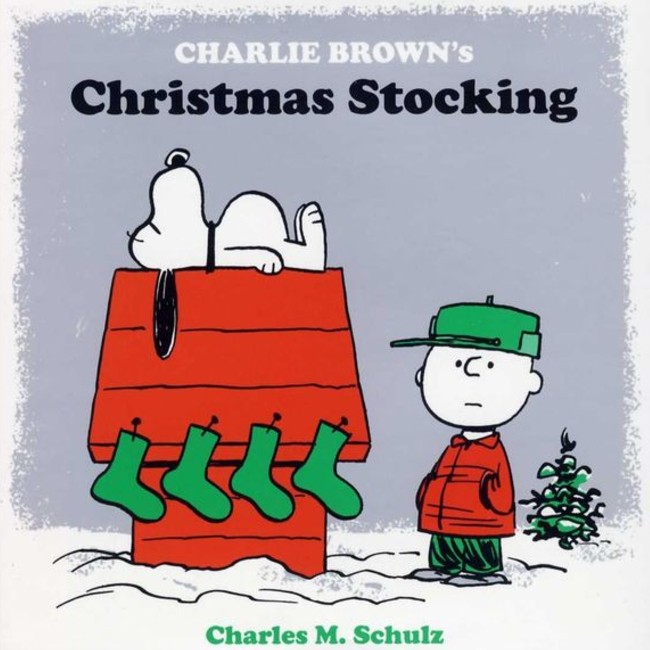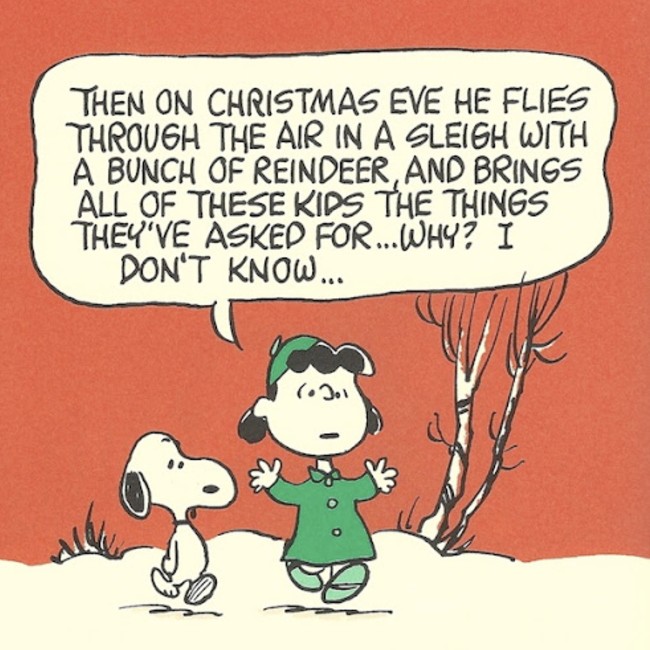
There’s no question that Peanuts makes Christmas special.
Spending time with Snoopy, Charlie Brown. Lucy, Sally and the rest of the thoughtfully lovable cast of characters brings not only a richness to proceedings since these are kids who really think things through, but a quirky delightfulness as they pose the sorts of questions that, when uttered, make you realise how strange some festive customs are.
It’s the perfect mix of philosophy, spirituality and quirky fun and together it makes each and every Peanuts’ Christmas moment a total well-rounded joy.
In Charlie Brown’s Christmas Stocking by Charles M. Schulz (who sadly passed away in 2000), which is combination of two illustrated stories – Charlie Brown’s Christmas Stocking (December 1963) and The Christmas Story (December 1968) – which first appeared in Good Housekeeping and Woman’s Day magazines respectively, we see these two seemingly disparate elements coming together to gloriously good effect.
As the notes in the book explain, the two stories were released with side of one of the most iconic Christmas specials ever released, A Charlie Brown Christmas (December 1965), with the first tale positioning the comic strip for its eventual role as an integral part of the festive season, through both the animated special but also the 1964 book Christmas is Together-Time.
The religious aspect of Christmas is there right from the first page of Charlie Brown’s Christmas Stocking with Linus declaring to Charlie Brown, with his endearing trademark earnestness that “I’m not going to hang up a Christmas stocking this year … I’ve decided it’s not scriptural!”
As you might imagine, Linus’s older sister Lucy doesn’t share that sentment.
“Two stockings? Why not two stockings? I have two feet, don’t I?”
And there you have it – God and mammon side-by-side, part of a recognition by deeply-religious Schulz that while Jesus might be “the reason for the season”, as the somewhat hackneyed rhyme declares, a great many other cultural traditions have grown up around the holiday and are as meaningful to many people as the person from whom the event originated.

There’s a great diversity of opinion over Christmas, reflected in the fact that Snoopy has multiple stockings nailed to his doghouse while Schroeder is vexed about hanging up his stocking since there is no evidence Beethoven did so and Sally is more concerned about suing the architect of her family’s home since there is no obvious place to even hang a stocking.
Frieda, the one with naturally curly hair is even worried about stockings since Santa is naturally predisposed to brings lots of presents to girls with follically-gifted heads!
Charlie Brown, as you might expect responds to all of this divergent musing with a great deal of anxiety and concern, aware that thermostats are no place to hang stockings, but nor are TVs, non-existent fireplaces, his worry not enhanced by Sally crying out close to midnight, with no thought to her brother’s troubled state of mind:
“Think of something! Think of something! Santa Claus will be here any minute, and all you do is say your stomach hurts!”
He does solve the issue to Snoopy’s bemusement and Sally’d fervent gratitude but the whole delightful tale underlines how wonderfully well Schulz married the sacred and the secular in a way that never feels exclusionary but whole and accepting of current festive realities.
The Christmas Story by way of contrast begins in a much more demonstratively religious vein with Linus recreating the start of the TV special by reciting the Christmas story from the Gospel of Luke, a hushed and evocative experience that can’t help but affect you no matter your belief.
Snoopy feels chastened not to have known that Christmas has its origins around the birth of Jesus but Lucy, in typically and hilariously bullish fashion, places her faith in Santa Claus, posting him mail even though she isn’t sure why he even does it in the first place.
Snoopy naturally has the final word declaring that “I’m going to have to be careful … all this theology could ruin my Christmas!” but in the end this story, while asserting the primacy of Jesus in the Christmas story, again doesn’t dispense with the secular accouterments entirely, emblematic of Peanuts ability to have a foot in both camps, an elegance of belief that never feels halfhearted or indecisive but wholly appreciative of the diversity and extent of modern Christmas belief.